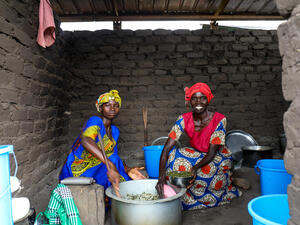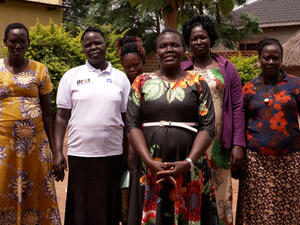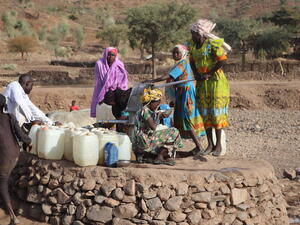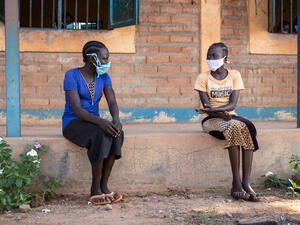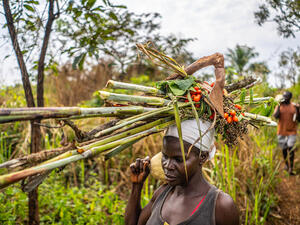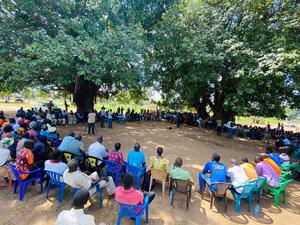UNHCR, OPM prepare for possible surge in refugee arrivals from neighbouring DRC and South Sudan
UNHCR, OPM prepare for possible surge in refugee arrivals from neighbouring DRC and South Sudan
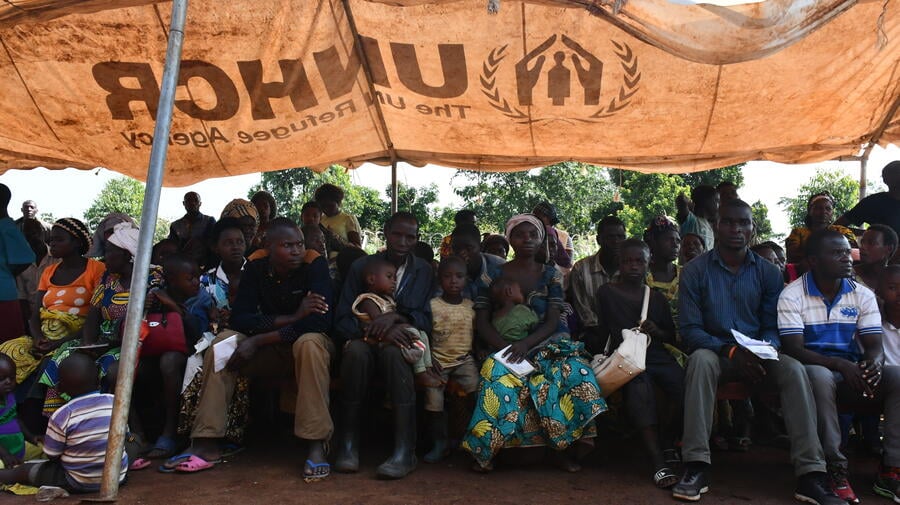
Newly arrived refugees from the Democratic Republic of Congo at Kyaka reception centre in South-western Uganda. Refugees are registered and provided shelter and food assistance before they are transported into the refugee settlements where the government of Uganda has already demarcated plots of land for each refugee family.
Thousands of refugees have continued to arrive in Uganda this year despite some positive political developments in the neighbouring Democratic Republic of Congo (DRC) and South Sudan. Now, amid reports of deteriorating security conditions in the eastern part of DRC and in the Equatoria region of South Sudan, UNHCR and the Office of the Prime Minister (OPM) together with NGO partners are preparing to scale up services for a potential influx of 40,000 new arrivals at reception and transit centres.
According to UNHCR-OPM joint border monitoring reports, so far this year, more than 34,000 new refugees have arrived in Uganda, of whom over 16,000 are from South Sudan. Arrivals from South Sudan have increased in May by 14 per cent over previous month with the daily average of 194 arrivals. Violations of the ceasefire agreement by armed parties to the conflict have been reported by the Ceasefire Monitoring Body (CTSAMM) in Yei River State. Should they persist, new arrivals from South Sudan to Uganda may continue to increase during the weeks ahead.
The situation on the DRC border is equally worrying. Over 17,000 Congolese have come to Uganda so far this year. Reports received from various sources indicate that recent hostilities among armed groups in the DRC’s North Kivu province have led to more than 100,000 people fleeing their homes in April. Of these, an estimated 60,000 people fled as a result of fighting around Kamango near the town of Beni in North Kivu.
Access to these insecure areas is highly challenging, making fact-checking as well as delivery of assistance virtually impossible. UNHCR is alarmed by this situation and the potential for a significant increase in new arrivals, further complicated by the fact that a number of the newly displaced Congolese are fleeing Ebola-affected areas.
The total number of refugees in the country is now 1.23 million. Uganda continues to maintain its open door policy of receiving refugees, but the ongoing influx is stretching the available resources to limits, at a time of limited support to the Refugee Response Plan and to UNHCR’s country programme in particular.
UNHCR and OPM are working on site development in Nakivale, Kyaka II where refugees from the DRC will be settled, and Rhino camp settlement in Arua district for refugees coming from South Sudan. UNHCR urgently needs to expand and repair the Reception Centres for new arrivals in Nakivale and Rwamanja, and the transit centre in Bundibugyo district.
UNHCR and partners have Ebola screening facilities at all collection points and reception centres. However these facilities require immediate upgrading, including support to the designated isolation facilities in the districts that host refugees. Additional capacity and resources are needed for OPM to carry out biometric registration at border points to ensure faster processing of the new arrivals and avoid congestion at the reception and transit centres.
Core relief item (CRI) stocks including shelter materials (plastic sheets, poles) are worryingly low and require immediate replenishment. As a preparedness measure, UNHCR needs to increase the CRI stock to serve the additional contingency of 40,000 individuals. These basic supplies include soap, sanitary materials, blankets, mats, jerry cans, and kitchen sets to cater for the immediate needs of the new arrivals.
“We are very concerned at signs there could be significant further displacement,” said Joel Boutroue, UNHCR Representative in Uganda. “The Government remains willing and open to receive those fleeing the worst of circumstances. OPM and UNHCR together with their partners are experienced in emergency response and have demonstrated since 2016 the capacity to receive thousands of traumatised people, save lives, register, and document, protect and assist refugees,” he continued. “We count on international solidarity for Uganda to continue this work.”
For more information or request for interviews, please contact:
- In Kampala, Uganda: Duniya Aslam Khan, [email protected], +256 772 701101


